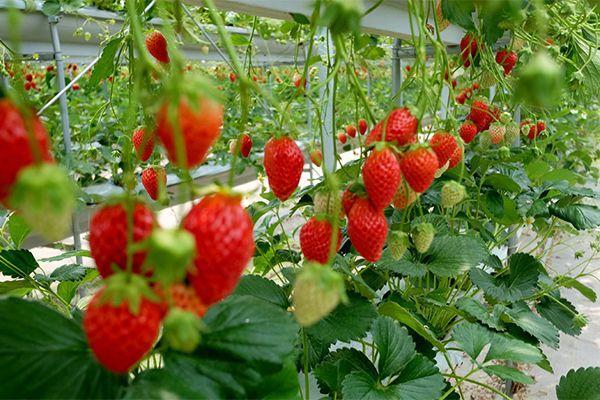

— Blogs —
—Products—
 Consumer hotline +8618073152920
Consumer hotline +8618073152920 WhatsApp:+8615367865107
Address:Room 102, District D, Houhu Industrial Park, Yuelu District, Changsha City, Hunan Province, China
Product knowledge
Time:2023-09-17 20:32:28 Popularity:582
INTRODUCTION: Strawberry is an important economic crop, but its growth process is vulnerable to meteorological disasters. The introduction of agrometeorological stations can monitor meteorological changes in real time and provide detailed meteorological data to provide scientific basis for strawberry greenhouse planting and guarantee its production and quality.
The growth process of strawberries is greatly affected by meteorological changes, especially by the interference of weather abnormalities and other factors, which can easily lead to quality degradation and even serious losses. Therefore, the introduction of agrometeorological stations in strawberry greenhouse planting can provide growers with detailed meteorological data and timely understanding of meteorological changes inside and outside the greenhouse, so that targeted management and measures can be taken to optimise the strawberry growing environment and safeguard the growth and quality of strawberries.

The application of agricultural weather station can be viewed from the following aspects:
1. Real-time monitoring of meteorological data inside and outside the greenhouse
The agricultural weather station can monitor real-time meteorological data such as temperature, humidity, light, wind direction and wind speed inside and outside the greenhouse, and push the data to the grower through wireless transmission technology. This is conducive to growers' timely access to weather change information, improving the accuracy and stability of strawberry production and reducing the impact of environmental factors on strawberry yield and quality.
2. Providing long-term meteorological data
Agricultural weather stations can provide long-term meteorological data, including temperature, humidity, precipitation, light and other data, which provide growers with a scientific basis to help them understand the climatic characteristics of the region and the optimal period for strawberry cultivation, so as to formulate a reasonable planting plan, and to better predict and prepare for possible meteorological disasters.
3. Optimising the strawberry growing environment
Strawberries need a certain amount of light and temperature to grow and develop normally, therefore, when planting strawberries in greenhouses, growers need to adjust the environment of the greenhouses to better meet the needs of strawberry growth. Agricultural meteorological stations can provide timely meteorological data inside and outside the greenhouses to help growers adjust the temperature, humidity, ventilation and other environmental parameters in the greenhouses to provide a more suitable environment for the growth of strawberries.
4. Early warning and preparation for meteorological disasters
Strawberry cultivation is greatly affected by meteorological factors, and once a meteorological disaster occurs, strawberries will be seriously injured. The agro-meteorological station can monitor the meteorological data, provide timely warning and corresponding precautionary measures, such as heat preservation and covering, moving water and fertiliser, etc., to reduce or avoid the quality decline and production loss of strawberry due to meteorological disasters.

Strawberry is a kind of fruit widely grown in the world, and its main production countries include the following:
1. United States: The United States is one of the largest strawberry producing countries in the world, with major production areas including California, Florida and other places. The United States is an important exporter of strawberries with huge production and stable supply.
2. China: China is the second largest strawberry producing country in the world, with major production areas in Jiangsu, Shandong, Fujian, Hubei and other provinces. The scale of strawberry cultivation in China is expanding year by year, and the quality and production are also improving.
3. Mexico: Mexico is an important strawberry-producing country in North America, with major production areas in the western and central regions. Mexico's climatic conditions are favourable, making it possible to supply strawberry products all year round.
4. Spain: Spain is an important European strawberry production countries, the main producing areas are located in the Andalusia region. Spain's warm climate allows it to provide a large supply of strawberries in the winter and early spring seasons.
In addition to the above countries, other major strawberry producing countries include Japan, Korea, Poland, Egypt and Morocco. All of these countries have achieved sustainable strawberry production through different climatic conditions and growing techniques, providing an abundant supply of strawberries to the global market.
Conclusion:
The introduction of agrometeorological stations is of positive significance to the production and quality assurance of strawberry greenhouse cultivation. Through real-time monitoring of meteorological data inside and outside the greenhouse, optimising the strawberry growing environment, and warning and preparing for meteorological disasters, agrometeorological stations play an important role in strawberry cultivation. If growers can make full use of the scientific data provided by the agrometeorological stations and optimise the management and operation in combination with their own experience, it is believed that the yield and quality of strawberries will be effectively improved.
Related recommendations
Sensors & Weather Stations Catalog
Agriculture Sensors and Weather Stations Catalog-NiuBoL.pdf
Weather Stations Catalog-NiuBoL.pdf
Related products
 Combined air temperature and relative humidity sensor
Combined air temperature and relative humidity sensor Soil Moisture Temperature sensor for irrigation
Soil Moisture Temperature sensor for irrigation Soil pH sensor RS485 soil Testing instrument soil ph meter for agriculture
Soil pH sensor RS485 soil Testing instrument soil ph meter for agriculture Wind Speed sensor Output Modbus/RS485/Analog/0-5V/4-20mA
Wind Speed sensor Output Modbus/RS485/Analog/0-5V/4-20mA Tipping bucket rain gauge for weather monitoring auto rainfall sensor RS485/Outdoor/stainless steel
Tipping bucket rain gauge for weather monitoring auto rainfall sensor RS485/Outdoor/stainless steel Pyranometer Solar Radiation Sensor 4-20mA/RS485
Pyranometer Solar Radiation Sensor 4-20mA/RS485
Screenshot, WhatsApp to identify the QR code
WhatsApp number:+8615367865107
(Click on WhatsApp to copy and add friends)